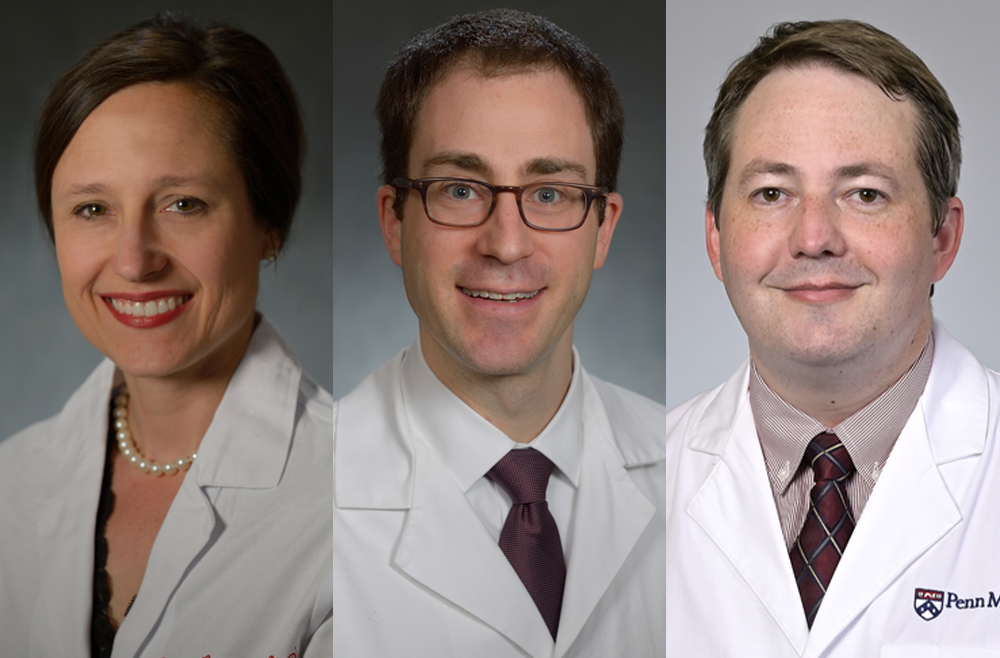Six New Members from Penn and CHOP Elected to the American Society for Clinical Investigation
Six physician-scientists from the University of Pennsylvania Perelman School of Medicine and Children’s Hospital of Philadelphia have been elected to the American Society of Clinical Investigation, joining one of the nation’s oldest and most respected medical honor societies composed of more than 3,000 physician-scientists representing all medical specialties.
Newly elected Penn members include:

Angela Bradbury, MD, an associate professor of Hematology-Oncology, with a concurrent appointment in Medical Ethics and Health Policy. Bradbury is a member of Penn Medicine’s Abramson Cancer Center, Basser Center for BRCA, and Penn Center for Cancer Care Innovation. As a medical oncologist with specialized training in clinical cancer genetics, cancer prevention, and medical ethics, Bradbury leads translational research focused on the ethics and clinical implementation of genetic medicine to ultimately reduce the burden of cancer and improve the health of individuals and families. Her research has been supported by the National Institutes of Health, American Cancer Society, Greenwall Foundation Program in Bioethics, American Society of Clinical Oncology, and Pennsylvania Department of Health.
Scott M. Damrauer, MD, an associate professor of Surgery and Genetics, the William Maul Measey Associate Professor of Surgery II, and an associate director of the Penn Medicine BioBank (PMBB). A clinically vascular surgeon at the Hospital of the University of Pennsylvania and the Corporal Michael J. Crescenz VA, Dr. Damrauer is at the forefront of research utilizing genomic approaches to understand the biological pathways and mechanisms underlying the etiology, progression, and treatment of heart and vascular disease to inform novel, precision medicine approaches to disease management. As the associate director of the PMBB, he helps oversee a genomic and precision medicine cohort of over 250,000 participants, employing hypothesis-driven and discovery-based approaches to identify the phenotypic spectrum associated with genetic variants.
Jonathan Miner, MD, PhD, an associate professor of Rheumatology and assistant professor of Microbiology, is one of the world’s foremost experts in Retinal vasculopathy with cerebral leukoencephalopathy (RVCL), a rare genetic autoinflammatory disorder caused by a mutation in the TREX1 gene that currently has no cure. As such, Miner is the director of Penn Medicine’s RVCL Research Center and is working toward treatments and therapies for those with RVCL and other rare conditions caused by mutations in the genes tied to immune response. Miner has also focused on studying viral infections, including models for Zika virus and West Nile virus, among others.
Newly elected CHOP members include:

Elizabeth Lowenthal, MD, MSCE, is an associate professor of Pediatrics and Epidemiology at the Perelman School of Medicine at the University of Pennsylvania and Research Director for the CHOP Global Health Center, where she is conducting research related to pediatric HIV and global child health. Lowenthal is also director of the Developmental Core of the Penn Center for AIDS Research. Her research interests focus on health priorities for children in low- and middle-income countries. She is also passionate about mentoring the next generation of researchers in these settings.
William Peranteau, MD, is a pediatric and fetal surgeon at the Children’s Hospital of Philadelphia, leading a translational research team whose overarching goal is to develop innovative prenatal and early postnatal gene therapies, including gene editing, for congenital diseases that cause health problems before or shortly after birth. His team has led some of the initial studies of in utero CRISPR-mediated gene editing demonstrating the safety and feasibility of this approach to rescue animal models of genetic liver, lung and multiorgan diseases. Perantau’s clinical practice includes general pediatric surgery with a focus on the surgical care of newborns prenatally diagnosed with birth defects and fetal surgery for a select group of patients.
Elizabeth Foglia, MD, MA, MSCE, is an attending neonatologist with the Division of Neonatology at Children’s Hospital of Philadelphia, performing clinical research related to neonatal resuscitation and respiratory management. She is the principal investigator of the “Delivery Room of the Future,” which was designated by CHOP as a Frontier Program in 2022. Her research aims to characterize the epidemiology of neonatal resuscitation, to improve monitoring and clinical performance during resuscitation, and to identify interventions to prevent mortality and long-term morbidity in high-risk infants. She is the Scientific PI for the American Academy of Pediatrics DRIVE Network, a novel consortium of delivery room hospitals to support neonatal resuscitation research.
The group will be officially inducted into the Society at the ASCI Dinner and New Member Induction Ceremony, April 5, 2024, as part of the AAP/ASCI/APSA Joint Meeting, April 5–7, at the Swissotel Chicago.

